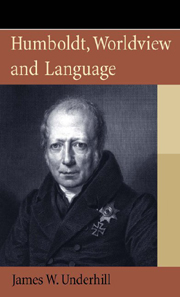Book contents
- Frontmatter
- Contents
- Acknowledgements
- Preface
- Part I Language and World
- Part II Humboldt, Man and Language
- 7 Worldview (Weltanschauung or Weltansicht)
- 8 Sprache
- 9 The Work of the Mind
- 10 Form
- 11 Creativity, Culture and Character
- 12 Catching the Character
- 13 A Seeing and Feeling Worldview
- 14 Four Dangers in the Comparative Approach
- 15 Reformulating the Worldview Hypothesis World
- 16 A Final Word
- Glossary
- Bibliography
- Index
16 - A Final Word
from Part II - Humboldt, Man and Language
Published online by Cambridge University Press: 12 September 2012
- Frontmatter
- Contents
- Acknowledgements
- Preface
- Part I Language and World
- Part II Humboldt, Man and Language
- 7 Worldview (Weltanschauung or Weltansicht)
- 8 Sprache
- 9 The Work of the Mind
- 10 Form
- 11 Creativity, Culture and Character
- 12 Catching the Character
- 13 A Seeing and Feeling Worldview
- 14 Four Dangers in the Comparative Approach
- 15 Reformulating the Worldview Hypothesis World
- 16 A Final Word
- Glossary
- Bibliography
- Index
Summary
Those who seek simple classifications for things will perhaps be disappointed with this short study of worldview which has led us back through Whorf, Sapir and Boas to discover something of Humboldt's linguistic philosophy. Simple classifications might be useful when we are dealing with simple things. But for Humboldt, language is not made up of things: objects to be explored and catalogued. Nor was he enamoured of classifications. If he was wary of them, it was because classifications are so often used to pigeonhole languages. As such, divisions and dissections will more likely deform our perception of the living activity of speech as it is distilled in language. Each language is a complex developing system, the vibrant synthesis of almost infinite individual expression. As such, it will always defy exhaustive description. Classifications offer not conceptions but misconceptions, if they deceive us into believing that we can rise above language to circumscribe the limits of different languages and compare them with some omniscient, supra-linguistic intelligence. God may be able to do so, but men and women live and breathe and think within language: within a specific language system. We may be able to intuit something of a foreign language's incommensurate difference which contrasts with our own mode of thought, but the belief that we can pin that difference down is pure folly. And the desire to pin it down betrays the fact that we have transformed speech (the dynamic interactive force which binds people together in time and space) into a model of language perceived as a static object, an object of scientific study.
- Type
- Chapter
- Information
- Humboldt Worldview and Language , pp. 144 - 146Publisher: Edinburgh University PressPrint publication year: 2009



